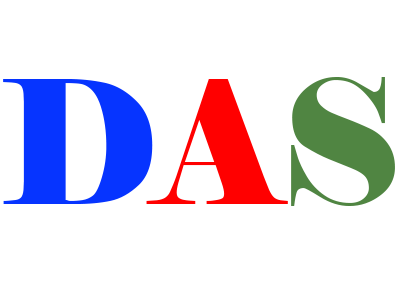Dear friends,
In recent weeks, the unbelievable story of corruption of parliaments across Europe by the Caspian autocracy of Azerbaijan has created big waves in Germany.
Suddenly Azerbaijan’s rulers and their apologists’ strange love for the oil-rich country in the Caucasus were debated in the Bundestag. The issue made the headlines of papers and television news. It was discussed on popular talk shows before millions of viewers. It played a role in the resignation of MPs from the governing CDU. It triggered a long-overdue debate on how to protect parliamentarians from being manipulated by determined autocracies.
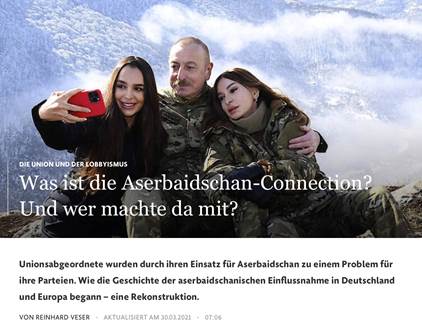
FAZ: “What is the Azerbaijan connection? And who took part?“
ESI has written about this scandal for a decade. We published many reports and more than two dozen newsletters. For years these had no impact. Until April 2017 this caviar diplomacy, which had led to the capture of Europe’s leading human rights institution charged with defending the European Convention on Human Rights, was flourishing. It was simply too easy to bribe and seduce many of those parliamentarians Europeans had elected to represent them.
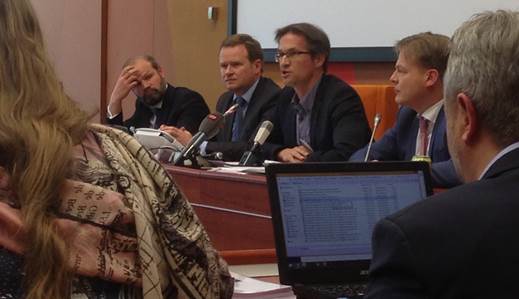
Calling on the Council of Europe to act on the biggest scandal in its history:
John Dalhuisen, Frank Schwabe, Gerald Knaus, Pieter Omtzigt (2017)
In 2017 a bipartisan coalition of MPs from across Europe, led by Pieter Omtzigt from the Netherlands and Frank Schwabe from Germany, led the charge for an investigation of these serious allegations. It achieved the resignation of Pedro Agramunt, the president of the Parliamentary Assembly of the Council of Europe (PACE). An official report in 2018 described the tip of the iceberg of this scandal, naming some of the members of PACE involved and calling on authorities across Europe to act.
Far too little has happened since.
In January 2021 three former PACE members were sentenced by a court in Milan to four years in jail. In Germany parliamentary immunities were lifted and prosecutors started house searches. However, most of those involved in this policy since 2003 have walked away with impunity.
For the Aliyev regime, almost two decades of efforts to aggressively undermine democratic institutions remained without consequences. It was never challenged on this policy in the Council of Europe by other members states.
This week we discussed the lessons from this scandal in a long interview in the Frankfurter Allgemeine Zeitung, which is now also available in English.
May these debates contribute to serious efforts to make similar attacks on the integrity of democratic institutions less easy in the future.
Yours sincerely,

Gerald Knaus
FAZ interview on caviar diplomacy in Europe:
A general atmosphere of venality
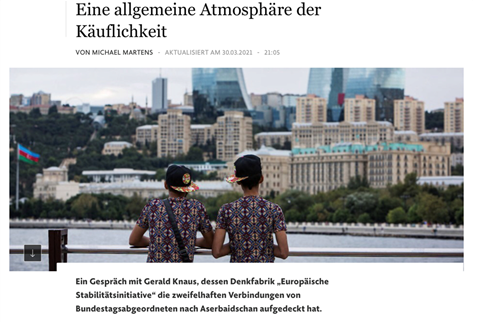
ESI Interview on the biggest scandal in the history of the Council of Europe
A conversation with Gerald Knaus, whose think tank European Stability Initiative has exposed the corrupt connections of members of the Bundestag to Azerbaijan.
Question: Mr Knaus, with reports from your think tank, the European Stability Initiative, or ESI for short, you initiated a development more than ten years ago that is now also creating a stir in the Bundestag: Apparently, several current and former members of the CDU/CSU have allowed themselves to be bought by the regime of the Azerbaijani dictator Ilham Aliyev. How did your research begin?
Knaus: We were researching the situation of women’s rights in Azerbaijan in 2009, when a controversial referendum was held to allow Ilham Aliyev to become president for life. There were protests and arrests. Two young activists we knew were beaten up in a restaurant in Baku by paid hooligans. When they went to the police, it was not the perpetrators who were investigated, but they who were arrested and sent to prison. That was when we decided to research the situation of young dissidents and came across something unexpected: while the repression in the country was getting worse, the assessments of the situation by the Council of Europe, to which Azerbaijan was admitted in 2001, were becoming more and more positive. This was strange. We began to look into how this could have happened.
Question: So in the beginning there was no suspicion of corruption against Western politicians?
Knaus: I could not have imagined what we soon found out about the Council of Europe and European politicians active there. I was naïve. Then in 2012, insiders explained to us how this policy worked: parliamentarians from all over Europe received jewellery, vacation trips and money, election observers were getting tens of thousands of euros for positive statements about Azerbaijan. Staff at the Council of Europe confirmed to us behind closed doors that Azerbaijan’s actions were an open secret in Strasbourg. Other parliamentarians said they had long suspected some colleagues of acting strangely in Baku. But how to write about it without hard evidence? The first task was to explain exactly how the regime strategically bought votes in the Council of Europe and to describe who spoke and voted publicly about Azerbaijan and how. We traced how networks in the Council of Europe systematically elevated apologists of the Azerbaijani regime to leading positions. We saw that certain MPs spoke out in defence of the regime in every debate on Azerbaijan. Many politicians from all over Europe regularly went to Baku as election observers to call elections free and fair, even though the voting was like in the GDR.
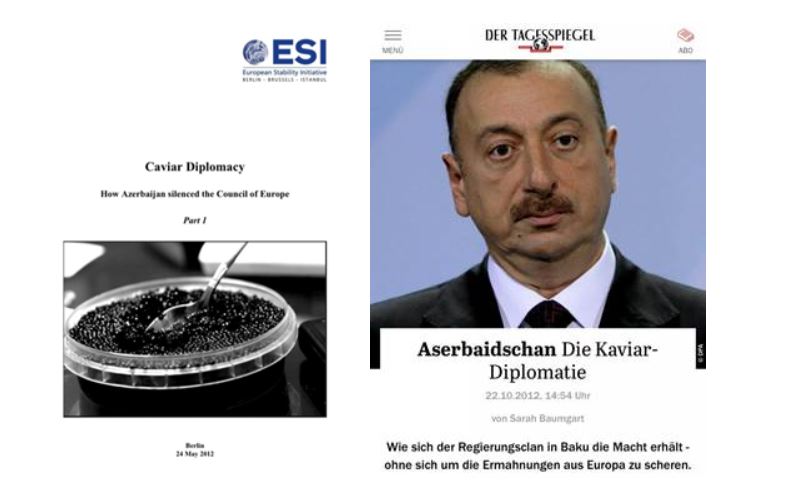
May 2012 report – Coverage in Der Tagesspiegel
Question: And you thought you could bring down this system with a few reports?
Knaus: We hoped: If we describe this, there will have to be an investigation. It was about bribery of MPs in the most important human rights institution in Europe. But that was also naïve. In the next five years, everything got much worse, in Azerbaijan as in the Council of Europe.
Question: ESI coined the term caviar diplomacy – what does that mean?
Knaus: That was the name of our report from May 2012, in which we described how the Aliyev regime infiltrated the Council of Europe. The symbol of this policy was caviar, but in fact it was about a lot of money. Jewellery, expensive carpets, invitations with business class flights to Baku including a stopover in luxury hotels in Istanbul. This was a test: whoever accepted such gifts was a candidate for further, bigger ones. This was also the case with the Italian Christian Democrat Luca Volontè, who was sentenced to four years in prison in Milan in January this year for accepting bribes from Azerbaijan. Volontè was not just any MP, but leader of the European People’s Party group, the largest in the Parliamentary Assembly of the Council of Europe, which includes the CDU. He helped mobilise a majority of MPs, who he listed in emails to his accomplices in Baku, to vote down a resolution on political prisoners in Azerbaijan in January 2013. One consequence of this scandalous vote was another wave of arrests in Azerbaijan. All those who had cooperated with the Council of Europe in Baku were arrested. Another consequence was that Aliyev could publicly declare with a cold smile that there were no political prisoners in his country – after all, the Council of Europe had confirmed this, with 125 votes.
Question: Could all this be proven in court?
Knaus: Only if prosecutors also take it to court like in Milan. The Italian public prosecutor’s office showed that Volontè set up a consulting firm in Milan at the end of 2012. Three weeks later, 220,000 euros were transferred to its account from Azerbaijan via a shell company. In the end, a total of 2.4 million euros was transferred to Volontè by mid-2014, and he even expected more than 10 million. The fact that this did not happen was due to the Italian banking supervisory authority and Milanese prosecutors who, during a raid, secured Volontè’s communication with the Azerbaijani financiers.
Question: What were the connections to Germany?
Knaus: Years before, the former CSU member of the Bundestag, Eduard Lintner, who was, among other things, parliamentary state secretary in the Ministry of the Interior and until January 2010 in the Council of Europe, had always sided with Azerbaijan there. Lintner, too, regularly went to Azerbaijan to observe elections, during and after he sat in the Council of Europe. He himself praised the completely manipulated parliamentary elections in 2013 as exemplary. Lintner also financed “private election observation missions” by other politicians, who always mutated into admirers of the regime in Baku. The same shell companies, with owners in the Virgin Islands, that had transferred money from Baku to Volonte’s consulting firm transferred money to Lintner. Since the beginning of 2020, German prosecutors have been investigating what this was all about.
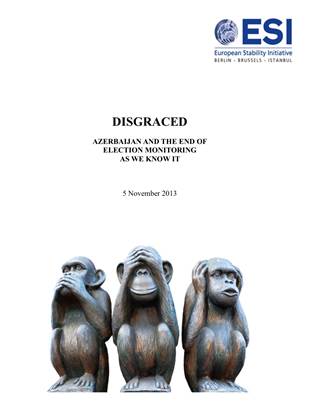
When politicians from across Europe participated in a farce – November 2013
Question: The large majority of the CDU/CSU in the Bundestag is certainly not corrupt. But why did this majority for years tolerate clear indications of dubious and probably also lucrative contacts between some of their colleagues and Azerbaijan? Out of party discipline? Because they were overworked? Or weren’t interested?
Knaus: Azerbaijan and the Council of Europe appeared to many to be remote issues far from the concerns of ordinary voters. But it is a fallacy to think that this is far away and none of our business. The Parliamentary Assembly of the Council of Europe in Strasbourg, which meets four times a year, is made up of members of national parliaments, in Germany’s case the Bundestag. If MPs take bribes in Strasbourg, they continue to function in this way in national parliaments afterwards, as corrupted politicians. And if even we, a small think tank from Kreuzberg, were able to find out what happened in Strasbourg, then the secret services of large countries certainly know that too. This is how politicians become susceptible to blackmail – also in national parliaments and in their later careers. Luca Volontè met with Azerbaijani middlemen in Baku in the presence of members of the Russian Council of Europe delegation to discuss strategies. In addition, the parliamentarians of the Council of Europe elect the judges of the Human Rights Court.
Question: In Italy and Germany, public prosecutors are investigating possible participants in the corruption cartel. Have there been reactions in other countries as well?
Knaus: Prosecutors in other countries would also have to follow up on the information. So far, however, almost all the apologists of the regime we reported on have remained unchallenged. It would be ideal if one of those involved had incentives to appear as a principal witness.
Question: It is remarkable that ESI’s reports had no effect at all for years. Why did those involved feel so secure?
Knaus: The general atmosphere of venality was so widespread in Strasbourg that individual MPs who were outraged by it were simply resigned to it. Caviar diplomacy simply continued for five years after 2012. The regime in Baku even had Azerbaijani advisors to the Council of Europe arrested, that’s how secure it felt. Moreover, reports were launched in Brussels by certain circles claiming that we were financed by Armenia, or by a Russian gas lobby to prevent Azerbaijani pipelines. In addition, Thorbjørn Jagland, the then Secretary General of the Council of Europe and then Chairman of the Nobel Peace Prize Committee, also showed no interest in investigating into what was going on.
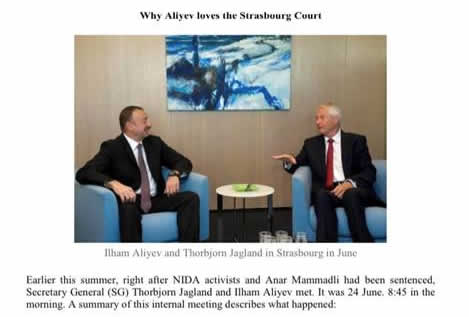
Question: You claim that the Secretary General of the Council of Europe was part of the corruption?
Knaus: No. But Jagland should have launched an investigation much earlier, given what was known in Strasbourg. He didn’t do it for years.
Question: Why not?
Knaus: We cannot see into people’s heads. But the Secretary General of the Council of Europe is elected by its parliamentary assembly, and there the so-called dark coalition of Azerbaijan and its allies at that time was dominant. Against this lobby, a Secretary General could hardly be re-elected. The largest group of delegates in the Council of Europe is the Russian one with 18 deputies. Apart from the Russians, most Spanish and Italian MPs, many Eastern Europeans and also influential Frenchmen were on Azerbaijan’s side in votes. The leader of the liberal faction, Jordi Xucla, was a defender of Baku. There were also leftists and social democrats, British Tories, European right-wing populists and several successive leaders of the European People’s Party group. Over the years, they had formed veritable entailed estates: New MPs took over Baku relations from their predecessors. In Belgium, some liberals showed an astonishing love for Azerbaijan, in Spain it was conservatives, in Eastern Europe ex-communists. Most Germans from all parliamentary groups voted with the Scandinavians and the Swiss for human rights. But there were some all the more astonishing exceptions – among them the recently deceased CDU MP Karin Strenz and Axel Fischer, who until recently was chairman of the audit committee in the Bundestag.
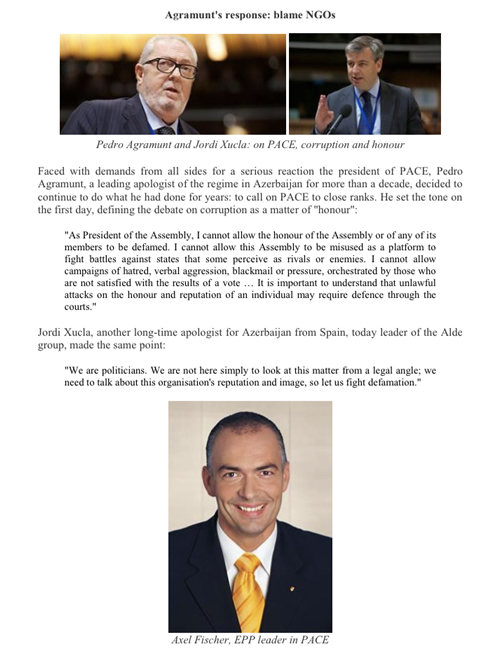
Blaming NGOs for uncovering a scandal (2017)
Question: At what point then did the ESI revelations have an impact?
Knaus: In December 2016, our report “The European Swamp” was published and received wide attention. But until April 2017, there was still bitter resistance to an independent investigation into the allegations. It was individual determined MPs, such as the German SPD politician Frank Schwabe and the Dutch Christian Democrat Pieter Omtzigt, who mobilised a broad coalition. Nevertheless, too little has happened across Europe. The Milan verdict against Volontè reads like a thriller, but if this politician alone, who was in Strasbourg for only a few years, received millions from Baku, one can only guess at how much money may have flowed since 2003. But so far only Italy and Germany are investigating the matter. Axel Fischer is being investigated by the Munich Public Prosecutor’s Office on the suspicion of bribery of elected officials. The Bundestag has therefore lifted Fischer’s immunity. His house was searched, as were Lintner’s and Strenz’s before him.
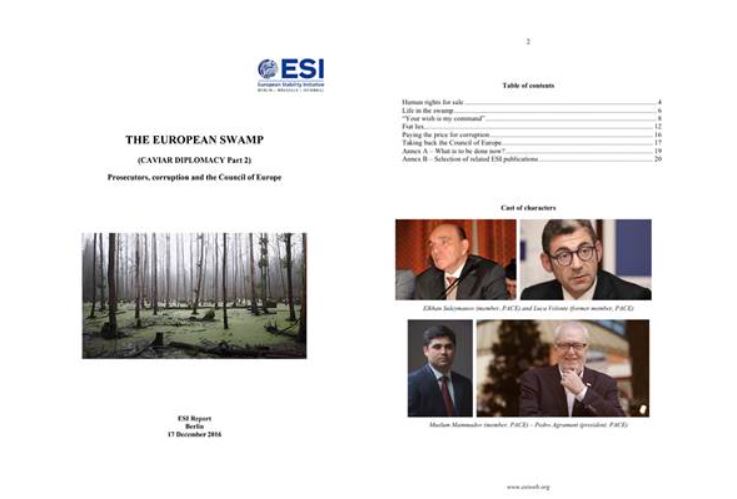
The 2016 report – three of its protagonists were sentenced in Milan in January 2021
Question: Some MPs are now rightly in the pillory. But isn’t there a danger that in the end the false impression “politicians are all corrupt anyway” will stick?
Knaus: This impression is created when institutions tolerate corruption for years and too few have the courage to address it and correct it in time. Until 2017, even Fifa had a stricter anti-corruption system than the Council of Europe. That has changed since then, at least in the Parliamentary Assembly of the Council of Europe. But the most important thing is that parties do not cover for their members in cases of serious suspicion, neither in Strasbourg nor in Berlin. Buying votes is never a trivial offence.
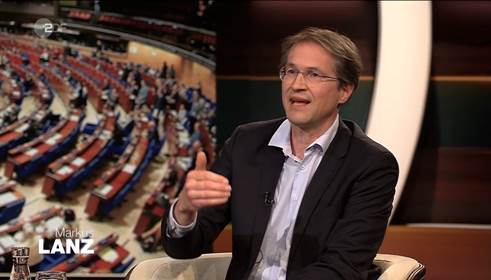
Speaking on German TV this week on Caviar Diplomacy
(“Markus Lanz”, from minute 52)
Question: Is there such a thing as a lesson from caviar diplomacy?
Knaus: The deep fall of the Council of Europe shows how easy it is to corrupt institutions when an authoritarian regime goes about buying parliamentarians with determination and a lot of money. This is a warning, because other states are probably trying it too, especially since they have seen that this policy was entirely risk-free for the regime in Azerbaijan. To date, the exposure of Azerbaijan’s bribery has had no consequences for Aliyev whatsoever. The Italian Football Federation once reacted severely to referee corruption and sentenced champion Juventus Turin to forced relegation to the second league in 2006. The member states of the Council of Europe, on the other hand, have looked the other way for years and to this day have done nothing to outlaw such behaviour by one of its members. Not even Azerbaijan’s right to vote in the Committee of Ministers has been suspended. Why should other states not follow Baku’s example? Buying votes in Europe is unfortunately far too easy.
Question: The exposure of caviar diplomacy is not the first example of ESI reports having an impact. What does a think tank have to do to have an impact on society and to bring about change?
Knaus: In order to be able to swim against the tide for years out of conviction, if necessary, it is important that institutions that financially support a think tank do not influence how and on which topics it publishes and when it does so. This goes for our most important donors – the Essen-based Mercator Foundation, the Swedish Ministry for Development Aid and the Open Society Foundations. In addition, we clearly define our own role: we work scientifically and independently. We are not lobbyists and do not take money from governments to advise them. This also allows us to take risks. Because one thing is clear: anyone who might have influence will be attacked.
Question: From the outside, it looks like ESI is working rather slowly. It sometimes takes years before you publish reports.
Knaus: Influence is always the result of years of work. It never works through one report alone, but through many publications, lectures, and meetings. At some point something will fall on fertile ground. That cannot be planned. You have to run with an issue for years. Moreover, we always do research as a team. As a rule, individuals cannot carry out an empirically based analysis on a complex topic. Sometimes we bring in additional experts. Years ago, we worked intensively on how the quality of government statistics could be assessed and brought a former employee of the European statistics authority Eurostat into the team for this purpose. When it came to visa liberalisation for the countries of the Western Balkans, we worked closely with former European interior ministers. On the crisis of the rule of law in Poland, we have been cooperating intensively with Polish lawyers for years.
Question: Is there a strategy for making think tank reports particularly effective?
Knaus: Influence for a think tank never consists of telling people what they should think. Influence happens when a report describes a situation so credibly and convincingly that readers come to similar conclusions to the ones we came to on their own. Many reports try to convince only those who have similar views anyway. Moreover, policy recommendations must convince practitioners. One must also never forget that people in important positions who can decide things live on an ever-growing mountain of papers. If an analysis is to stand out among the hundreds of studies that appear every week, it must be grippingly written. Because if people don’t remember a think tank’s report after a month, it’s as if it was never written. I hope that everyone who read our reports on Azerbaijan and the Council of Europe could remember them after a month. Like the prosecutors in Milan who started from our work. People think in stories. So we write stories. Only then can we succeed in influencing the world through papers.

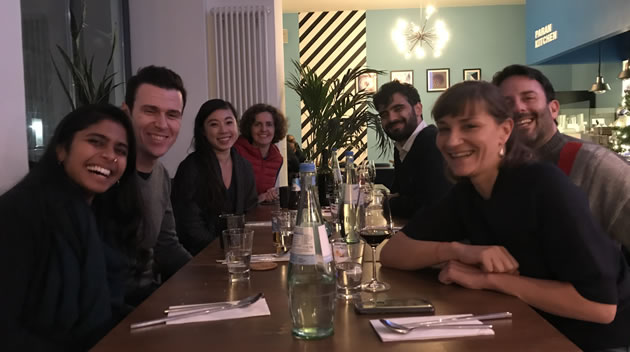
ESI
Video presentations
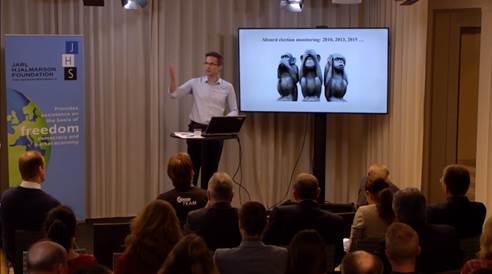
Corruption in the Council of Europe (September 2017)
Video: Jarl Hjalmarson Foundation

The end of shame? Azerbaijan, the Council of Europe and the
capture of Europe (November 2014). Video: Norwegian Helsinki Committee
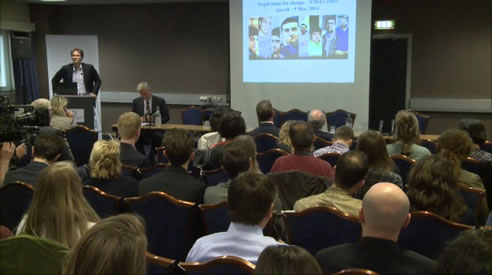
How the government of Azerbaijan has captured the Council of Europe
(May 2014) Video: Norwegian Helsinki Committee
Recent articles
Frankfurter Allgemeine Zeitung, Aserbaidschan-Affäre: Geschenke, Werbung, Verleumdung, 31 March 2021
Frankfurter Allgemeine Sonntagszeitung, Was ist die Aserbaidschan-Connection, und wer machte da mit?, 28 March 2021
Neue Zürcher Zeitung, Korruption, Kaviar, Kanzlerdämmerung: Die Union erhält eine Lektion in Demut, 27 March 2021
STERN, CDU/CSU-Abgeordnete verwickelt: Soziologe erklärt, wie Aserbaidschan EU-Politiker kauft, 26 March 2021
VICE News, Aserbaidschan-Affäre: Der Diktator, die CDU, der Moderator und das Geld, 22 March 2021
Cicero, Interview mit Gerald Knaus. Aserbaidschan und die Union -30 Millionen Euro für “Kaviar-Diplomatie.”, 12 March 2021
Watch the video (from minute 52): ZDF, Markus Lanz, 25 March 2021
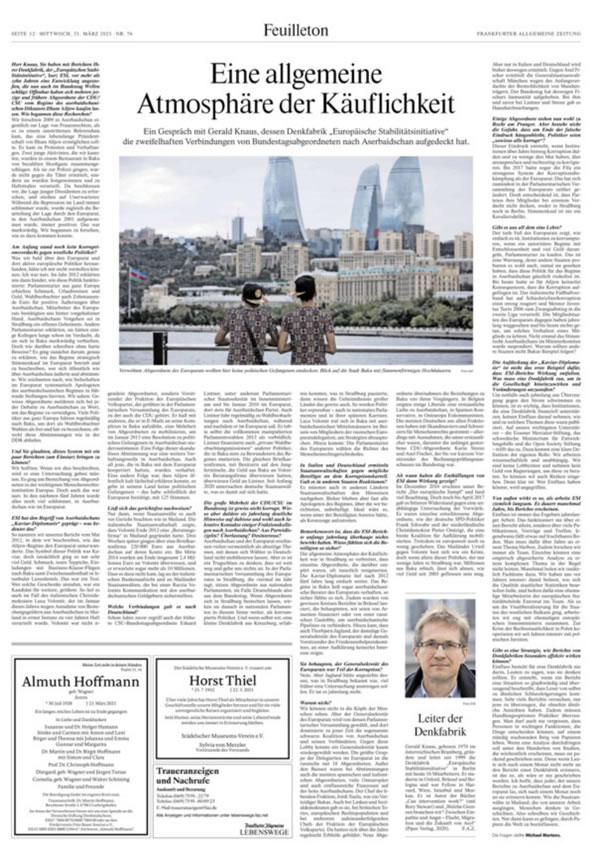
“A general atmosphere of venality”
ESI on the Council of Europe and the crisis of human rights (2011-2021)
“Generation Facebook in Baku – Adnan, Emin and the Future of Dissent in Azerbaijan”
Caviar Diplomacy – How Azerbaijan silenced the Council of Europe“
A Portrait of Deception – Monitoring Azerbaijan or why Pedro Agramunt should resign “
Ilham the Magician and the Council of Europe“
Showdown in Strasbourg – The political prisoner debate in October 2012 and Azerbaijan debacle: The PACE debate on 23 January 2013
Hunger strike, European values and an Open Letter
Victor Hugo in Baku – Visa free travel and human rights.
Disgraced – Azerbaijan and the end of election monitoring as we know it
Oslo abuse debate – Mr Jagland goes to Baku – June 2 Berlin event – a tradition of dissent
Andrei Sakharov and the defence of the unjustly persecuted
2014 and the threat to Sakharov’s legacy
The List of 98 Political Prisoners – in English
Moscow Appeal – The case for Leyla Yunus
The mercy of Commodus – The failure of Jagland
The LIST and arrests in Baku – Sakharov prize 2014
Dorian Gray in Europe – The End of Shame and Human Rights
The end of shame (Journal of Democracy)
Formula One and human rights – Vaclav and Rasul – Iwinski and the Garden Party
A European swamp – corruption and human rights”.
Merchants of Doubt or investigating Corruption
Spring cleaning – the corruption report on the Council of Europe is out
Houses of Cards – Post-truth politics from Skopje to Strasbourg
(And: German MPs Axel Fischer und Tobias Zech in Skopje)
Human rights with teeth (I) – Battle of Europe.
The European Stability Initiative is being supported by Stiftung Mercator

